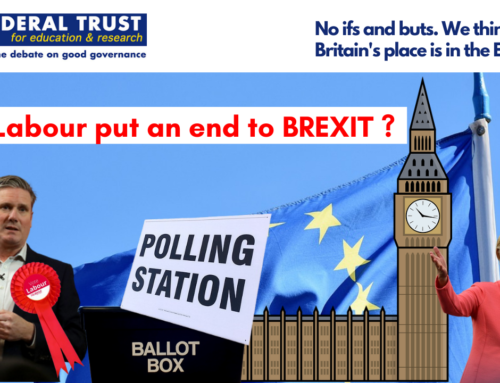
by Brendan Donnelly
Director, The Federal Trust
6th May 2020
Eight months before the end of the transition period the British government seems intent upon two courses of action which will exacerbate the inevitable political and economic damage to the United Kingdom when it finally withdraws from the European treaties. The government has, first, made clear that it will not seek in any circumstances an extension to the transition period; and, second, its self-serving and implausible interpretation of the Withdrawal Agreement relating to Northern Ireland has created well-founded doubts in the EU’s collective mind about its good faith on this and related issues.
Neither of these choices from the British government should come as a surprise to objective observers of the Brexit negotiations. Even to mitigate the damage imposed by Brexit would have required political and strategic thinking by British ministers of a high order. Instead, slogan-ridden incoherence has been the order of the day from the governments of Theresa May and Boris Johnson. British ministers essentially remain baffled and resentful that the UK is unable to continue enjoying the benefits of EU membership post-Brexit. This bafflement is no basis for a coherent negotiating strategy. Such an incoherent and self-absorbed approach was admittedly the only possible way of winning the EU referendum of 2016. It was over-optimistic, however, to hope that the winners would ever be able to shake off the habits they had acquired in their victorious campaign of four years ago.
Few informed commentators ever believed that the eleven months from January to December 2020 would be enough to negotiate and implement any significant agreement for the long-term relationship between the EU and UK. The possibility of an extension of the transition agreement was specifically envisaged in the Withdrawal Agreement. Initial negotiations in February had already made clear that there were wide divergences of view between the EU and UK on many issues. The gathering force of the Coronavirus pandemic in March both interrupted the negotiations and distracted resources and attention away from Brexit generally. It was, therefore, widely assumed in continental Europe and by many British observers that the Johnson government would agree to an extension of the transition period in its own interest. Opinion polling in the UK has suggested that a substantial majority of British voters anyway favour such an extension.
Setting its face against extension
There seem to be a number of (sometimes contradictory) reasons why the British government has set its face so firmly against extension. There is probably a lingering hope in some parts of the Conservative Party that an uncompromising stance will force the EU into concessions at the last moment; an expectation that the terms demanded by the EU for an extension will be economically and politically oppressive; and a fear that an initial extension will simply be the first step in a process designed to ensure that the transition regime, or something very like it, continues indefinitely. More important than all these hopes and fears is a simpler explanation: Boris Johnson was elected in 2019 on a slogan of “getting Brexit done.” Unlike most of the slogans in the woeful Brexit saga, this aspiration is one that is capable of at least apparent achievement. Johnson and his advisers have concluded the first step in this process by taking the UK out of the EU at the end of January 2020. They are now eager to notch up another triumph by bringing the transitional phase to an end as quickly as possible. The latter months of this year will be economically difficult for many of those who voted Conservative at the last General Election. It is no doubt Johnson’s calculation that many such voters will be cheered and invigorated by a final escape from the tyrannical European Union on 31st December.
The Conservative Party suffered in 2019 a cull of many among its most experienced and thoughtful members. This has left Johnson and his small clique of advisers in an unusually powerful position within the Party, not because of their strength but because of the weakness of any potential internal opposition to them. It is this cabal that determines the Conservative government’s European policy. Among Johnson’s advisers are a number who have always regarded the Withdrawal Agreement with loathing and who genuinely believe that the quicker and more radical the break between EU and UK the better. These advisers are now in the ascendant, with a “no deal” Brexit at the end of the transition period becoming daily more likely.
Michel Barnier has recently complained in distinctly undiplomatic terms about the unwillingness of the British side to engage in substantial discussion on controversial issues. In particular, it seems unlikely that any agreement will be reached by June on the Common Fisheries Policy (CFP), a possible precondition of any extension to the transition period in that month. There has been an observable “ramping up” in the Eurosceptic press of vitriol against the supposed unreasonableness of the CFP and the EU’s negotiating demands relating to it. The CFP was always an especial preoccupation of the UK Independence Party. The Conservative government knows that controversy surrounding it is a helpful way of reassuring the former UKIP supporters who now comprise a large proportion of its voters.
The Irish question
This disdain for the Withdrawal Agreement felt by Johnson and his advisers also manifests itself clearly in the case of Ireland. The clear and undeniable implication of the agreement finally reached at the end of 2019 was that the external border of the EU’s internal market should run through the Irish Sea, with corresponding checks and other formalities instituted for trade between Northern Ireland and the UK mainland. This was a proposition rejected by the May government, but it was a concession made by Johnson to secure a revised agreement in 2019.
Both the dismissive rhetoric and (in)action of the British government in preparing for these checks have led to considerable alarm in Dublin and Brussels that Johnson and his ministers have no intention of carrying out in good faith these checks on the British side. Such checks are essential to maintaining the integrity of the Single Market as long as there is an open border between Northern Ireland and the Republic of Ireland. If those checks are not carried out by the British government, it would rightly be seen by Dublin as a British attempt at blackmail, forcing it to choose between defending the Single Market and a reinstituted “hard” border between Northern Ireland and the Republic. The many years of controversy over the Irish “backstop” were, of course, designed precisely to avoid such an invidious choice.
It is hard to overstate the provocative gravity of this controversy, for the Brexit negotiations, for the future of Northern Ireland and for the UK’s standing in the world. If the EU comes to believe corporately, as many Member States already do individually, that the UK is not observing its obligation to implement the Withdrawal Agreement in good faith, then there will be no possibility of an agreement on the long-term relationship in any foreseeable future. The dire economic predictions for the implications of a “no deal” Brexit will then be tested by events, in an environment made infinitely more hostile by the consequences of COVID-19. The painfully won relative stability of Northern Ireland, founded on the Good Friday Agreement, will be put at risk, an outcome that will arouse particular opposition in the United States. This opposition from Congress and other American sources will serve to preclude any possibility of a favourable trade agreement between the USA and UK. The widespread perception of the present British government as a “rogue” administration will be reinforced by its cavalier attitude to the implementation of international treaties.
U-turn if you want to…
It may be that in the autumn the British government performs a dramatic volte-face and concludes that the risks associated with intransigence and bad faith are too great. It may at the last moment seek after all an extension of the transition period and give proof of good faith on Irish matters. The underlying incoherence of the Brexit project has dictated such oscillations in the past and may do so again in the future. It is, however, far from clear that the rest of the EU would be willing in those circumstances to accept the British request. The Withdrawal Agreement stipulates that any extension must be agreed by the end of June 2020. There would certainly be some in the European Council who would be unwilling to ignore in the autumn this provision simply to prolong what is increasingly regarded on the continent as a painful tug-of-war with a British government that does not know what it wants and indeed can never know what it wants. The British government likes to present its approach to the Brexit negotiations as grounded in its “equal sovereignty” with the EU. The EU’s equal sovereignty may lead it in October or November to conclude that “enough is enough” with the unreliable British and that no purpose is served by a further extension.
The EU has, moreover, made it clear that any request for an extension must come from the British side. Whatever the overwhelming rational grounds in favour of extension, Johnson will find it exceedingly difficult to submit in late 2020 such a request, which would require a change of domestic legislation in the UK and a confrontation with the most virulently Eurosceptic elements of his own Party. It would also imply to some of his critics that Johnson himself had fallen into the bad habits shown by his predecessor, Theresa May, of temporisation and delay on the European issue. Decisiveness in achieving an “oven-ready” Brexit is an important component of Johnson’s political (self-) image. He will be extremely reluctant to forego that image of decisiveness by apparently failing to complete the Brexit process on 31st December 2020.
As the COVID-19 tragedy has shown, this Conservative government is one that finds it exceptionally difficult to apologise for its mistakes. Johnson is unlikely to entertain having to apologise to his disappointed supporters for his failure to unfetter them from the chains of European slavery at the end of 2020.





